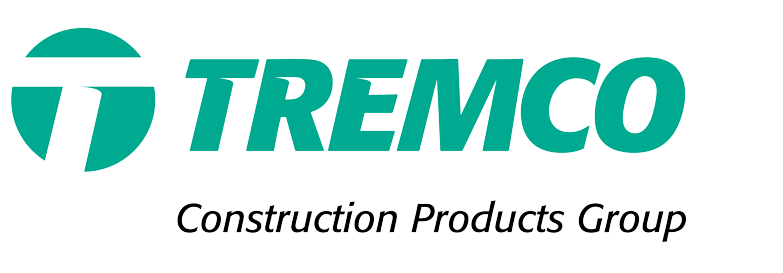The Ultimate Introduction to Epoxy Flooring
Estimated reading time: 11 minutes
In commercial and industrial workplace environments, epoxy resin floors are a popular flooring option because of epoxy resin’s broad range of desirable properties. However, because the topic of resin flooring can be complex, there may be some ambiguity about the fundamentals and nuances of epoxy floors.
So, the flooring experts at Flowcrete are here for you: we’ve put together a brief overview about epoxy flooring, the common types of epoxy floors, epoxy's advantages as a flooring system, and other useful related information.
Firstly, What is Epoxy Flooring?
In a nutshell, epoxy flooring is a type of synthetic resin floor system that is laid on top of concrete substrates as a form of protection and decoration. The systems can comprise of several layers of thermosetting resin that are coated, trowelled or poured, and generally applied onto a concrete substrate. Once the resin layers completely cure, the floor system forms a strong and permanent bond, acting as an impervious and decorative barrier to protect the substrate.
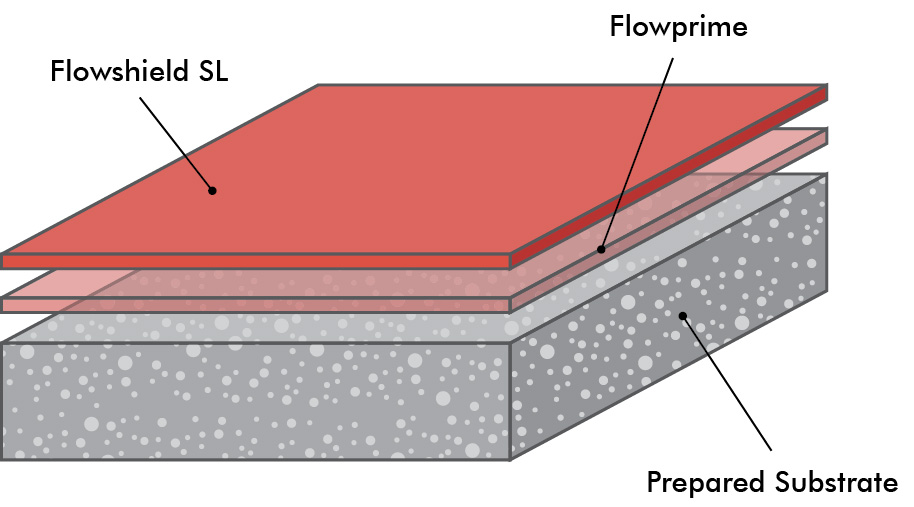
Illustration of a typical self levelling epoxy system with primer
Epoxy is probably the most widely known resin floor technology as a result of its good mechanical and chemical resistance properties. Epoxy floors can also be customised into a wide range of colours, styles, effects and decorative options.
However, there are different categories of epoxy flooring systems available for varied applications. Confusion is sometimes created when flooring terms are used interchangeably, eg. Coating = Flooring = Screed. This is not technically accurate since the different terms have their respective profiles and properties.
Let us clear things up: Here is an excellent Guide to the Specification and Application of Synthetic Resin Flooring by FeRFA (The Resin Flooring Association), detailing the different categories of synthetic resin flooring. Below is a preview of the types of flooring categories.
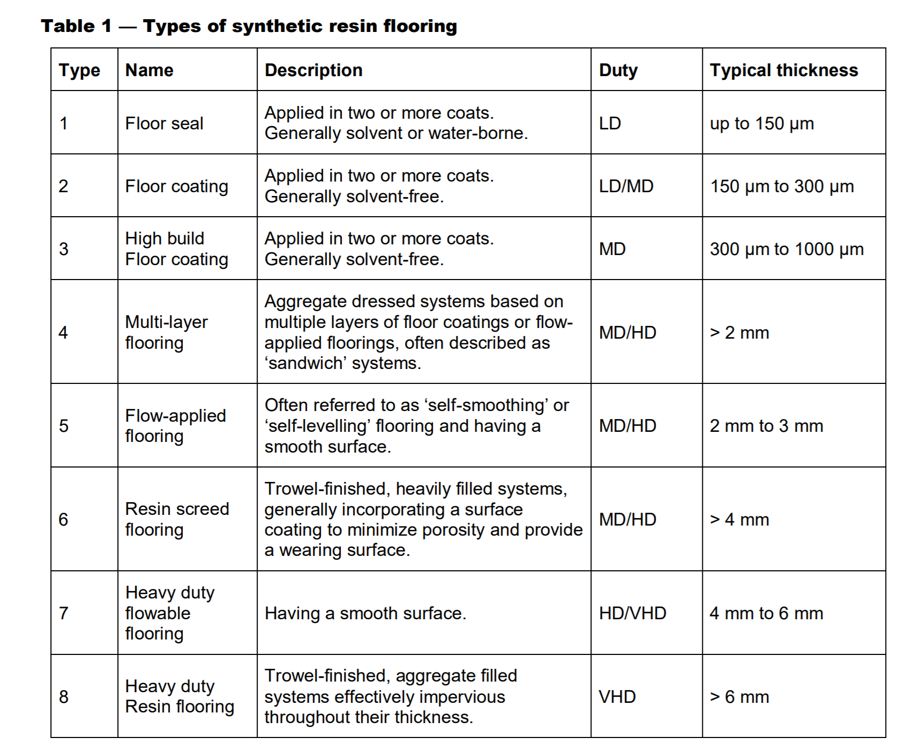 FeRFA: Synthetic resin flooring categories
FeRFA: Synthetic resin flooring categories
With proper separation, let's take a deeper dive into the different types of epoxy floors.
Types of Epoxy Flooring
In terms of aesthetics, epoxy floors are seamless, highly versatile and available to be produced in a wide range of colours, styles, effects and decorative options. These properties make them suitable for industrial and commercial facilities and locations. There are several general types of epoxy flooring, such as:
Epoxy Terrazzo Flooring
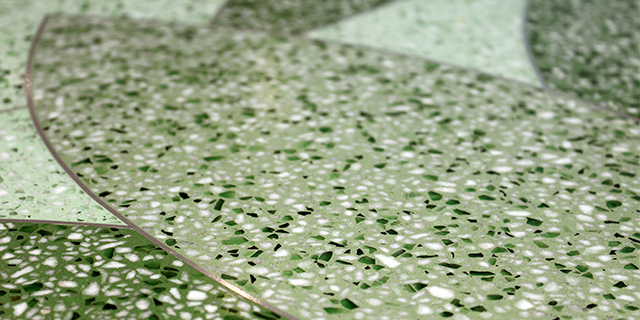 Flowcrete's Mondéco range: Seamless epoxy terrazzo flooring
Flowcrete's Mondéco range: Seamless epoxy terrazzo flooring
Epoxy terrazzo flooring provides a colourful, decorative, durable and seamless flooring surface. This type of flooring is created with a mix of coloured epoxy and selected aggregates (such as marble, mother of pearl, glass, granite, etc). After setting the mixture, the flooring is ground and polished, exposing the aggregate and delivering a smooth, decorative and hard-wearing floor finish. Epoxy terrazzo floors are not just highly decorative and very durable, they only require simple maintenance and have an outstanding life expectancy (upwards of 40 years). This floor system is ideal for large commercial venues thanks to its aesthetics, durability and lifespan.
Epoxy Flake Coating
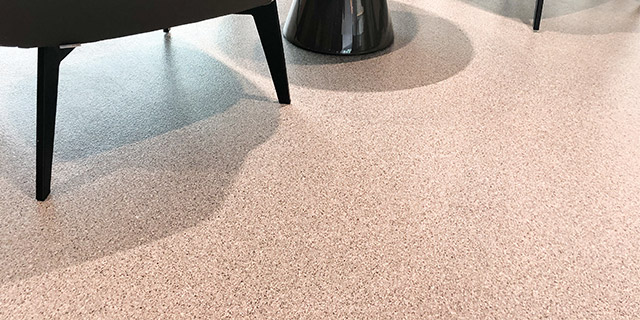 Flowcrete's Flowflake range: Seamless epoxy flake coating
Flowcrete's Flowflake range: Seamless epoxy flake coating
Epoxy flake coatings are created with varying sizes of flakes scattered over a coloured epoxy base coat and finally finished with a tough resistant clear sealer. It produces a decorative floor finish that is easy to clean and has good resistance to foot traffic and chemicals.
The epoxy flake coating option is ideal for shops, showrooms, restaurants and schools among many other commercial venues.
Epoxy Floor Coatings
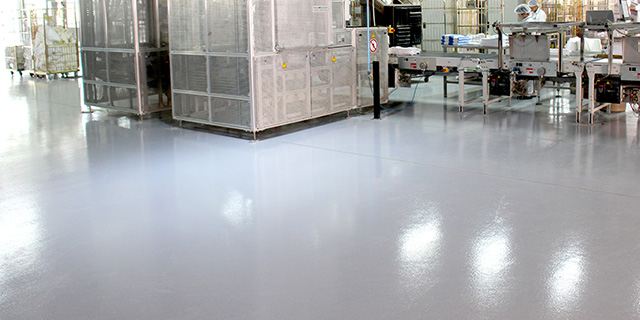 Flowcrete's industrial flooring catalogue
Flowcrete's industrial flooring catalogue
Epoxy floor coatings are sometimes also referred to as epoxy paint or epoxy floor paint. The finishes generally come in a uniform single colour, and their finishing can be chosen to be matte, satin or glossy. Epoxy floor coatings are generally used for areas with light to medium level of activities, and these can be for industrial or commercial areas. Since there is a long list of varieties and options for epoxy coatings, it is better to check with a flooring specialist to get the best-matched flooring. Dependent on the environment’s purposes and functions, there would be a suitable flooring solution available to meet the requirements.
Epoxy Self-Levellers
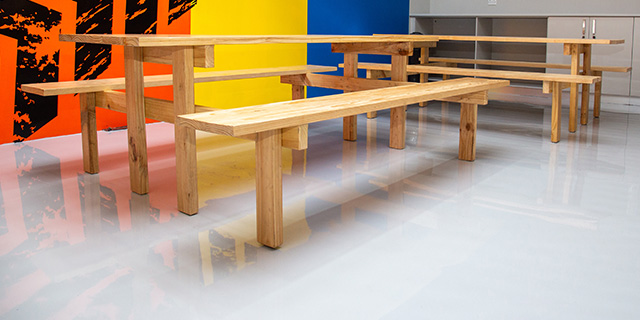 Flowcrete's Peran SL: Self-levelling epoxy
Flowcrete's Peran SL: Self-levelling epoxy
Self-levelling (SL) epoxy flooring is a category of flooring that has self-smoothing properties once poured onto the substrate. Generally, self-levelling systems are applied between 1 to 3mm and applied in liquid form for fast installation, resulting in a smooth, seamless finish. The resin-rich formulations of epoxy SL provide a very strong durable finish for heavy-duty demanding environments.
Antistatic Epoxy Flooring
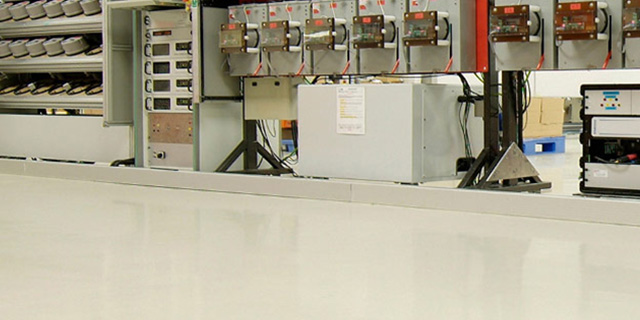 Flowcrete's antistatic epoxy flooring catalogue
Flowcrete's antistatic epoxy flooring catalogue
Antistatic epoxy flooring provides a seamless, hard wearing coating that prevents electrostatic charge from accumulating on the surface of the floor.
Antistatic floor systems should be compliant with antistatic standards requirements (eg. ANSI/ESDS2020, IEC 61340-4-1), and are designed to safely transfer the static charge – that can be generated from a person – to defined earthing points. There are specific antistatic flooring systems specifically tailored for light, medium and heavy-duty traffic.
Antistatic epoxy flooring is commonly used in laboratories, clean rooms, and specialised food processing facilities. It is typically used as part of ESD (Electrostatic Discharge) prevention in environments containing sensitive equipment or explosive contents, with environments that include the electronic, aerospace, automotive, and pharmaceutical sectors.
Epoxy Screeds
Epoxy screeds are part of a medium- to heavy-duty flooring system, and they are commonly used as a heavy-duty underlayment to receive a variety of resin flooring (such as anti-slip coatings, self-levelling epoxy coatings, etc). As a thicker type of flooring layer, an epoxy screed’s typical thickness is between 4mm and 6mm. Because epoxy screeds are thicker, they generally are to be trowel-applied, and may be power floated to produce a smooth, level finish.
Epoxy screeds have high strength and excellent impact resistance. Anti-osmosis properties may also be included in the epoxy screed to act as a damp-proof membrane.
With these properties, epoxy screeds are ideal for flooring systems in medium to heavy-duty industrial environments, such as manufacturing, food and beverage processing, and several others.
The specification/selection process of epoxy flooring is influenced by the expected functionalities and protection requirements based on the frequent activities and operations of the facility.
Benefits and Advantages of Epoxy Flooring
Let's explore the specific benefits and advantages of epoxy flooring. Epoxy flooring has several advantages and benefits compared to other floor coverings such as vinyl, tiles or carpet.
-
Aesthetics
Epoxy flooring can be applied as a seamless, easy-to-clean floor surface with a wide range of customisable colour options, as well as a variety of gloss levels (glossy, satin, matte). Further design options include the addition of coloured microchips and metallic pigment additives. -
Maintenance
Since epoxy is a seamless and impervious flooring option, the concrete substrate is protected from chemicals, dirt, liquids and other contaminants. This makes the floors easy to clean and requiring only a scrubber or standard mopping with a general-purpose cleaner – no waxing or buffing is necessary. Epoxy floors do not require much maintenance other than a standard cleaning, making them a great long-term value option. -
Safety
One of the lesser-considered advantages of epoxy flooring is its ability to include a non-slip profile by broadcasting sand onto the wet body coat during application. This is an important facet for commercial or industrial spaces as the safety of occupants should always be a primary concern. -
Durability
Workloads on epoxy floors can vary from foot traffic to truck and forklift traffic. An industrial flooring option can withstand daily abuse from a wide variety of equipment and manufacturing processes. As an abrasion and chemical-resistant material, epoxy flooring options can meet the durability needs of most industrial manufacturers. -
Environment Suitability
As one of the most versatile flooring options, epoxy flooring is great for a variety of environments such as industrial, commercial, medical, food and beverage manufacturing, aviation, recreational, healthcare, transportation, manufacturing, educational, grocery, retail and many more. -
Green Credentials
As a world-leading manufacturer of resin flooring, many solutions produced by Flowcrete are formulated to be solvent-free, contain low quantities of VOCs (Volatile Organic Compounds) and do not present environmental hazards.
Unwanted Results of Poor Flooring System Installation: Beware of Resin Floor Failures and Mishaps
Although resin flooring systems bring multiple benefits and advantages, these inherent benefits are realised only when the floor system is properly installed.
A critical component to ensure a successful floor installation is having a qualified flooring applicator carry out the installation works. Expertise and precision are key elements of the installation process, which makes it important to use the flooring services of experienced applicators. When planning your schedule, always consider that the installation time can vary depending on the thickness of the flooring system and the size of the project.
Resin floor systems that are applied improperly could result in delamination (chip and peel). This unwanted outcome is typically caused by poor surface preparation prior to the application of the final floor finish. The substrate has to be properly prepped before any coating can be applied.
Another type of floor failure is the occurrence of air bubbles (or blisters) in the resin flooring. This type of failure may be caused by too much moisture in the substrate. It’s important to be aware of this when applying a coating to a ground-level substrate. For substrates with higher levels of moisture content, please consult your local Flowcrete representative to ensure a fit-for-purpose solution.
Floor failure can cause damages to the substrate, so it is vitally important to select the correct floor system. Using the wrong type of resinous floor system for a mismatched environment can result in floor failure and ultimately substrate harm.
Overall, resin flooring systems can be a long-term, worry-free solution when installed by an experienced applicator. And because lifetime maintenance is so easy, resin flooring systems are an attractive flooring option for a variety of commercial and industrial applications.
How Much Does Epoxy Flooring Cost?
Material supply and installation cost considerations will vary depending on size, design, layout and type of epoxy flooring. Total lifecycle costs are usually advantageous for epoxy floors due to their low maintenance combined with longevity and durability.
As project costs vary on a case-by-case basis, Flowcrete works with approved applicators to provide accurate project quotations.
Difference Between Epoxy Flooring and Polyurethane Flooring
Sometimes, there may be some confusion about the difference between some types of resin polymers, such as the difference between floors made of epoxy resins, versus floors made of polyurethane (PU) resins. To clear up this confusion, here is an explanatory comparison between epoxy flooring and PU flooring.
A Final Note on the Ultimate Introduction to Epoxy Flooring
Epoxy floors are a great option for a variety of industrial and commercial environments, offering both aesthetics and performance. Explore Flowcrete's flooring products here, where we offer a wide range of resin flooring products, individually formulated from epoxy resins, polyurethane resins or methyl methacrylate resins.
Flowcrete has different flooring ranges that possess their individual advantages and suitability for different work environments. Let us know if you have a flooring project that may call for our flooring expertise.
